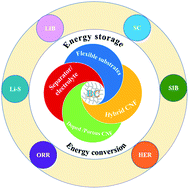Bacterial cellulose: an encouraging eco-friendly nano-candidate for energy storage and energy conversion
Abstract
Bacterial cellulose (BC), an eco-friendly nano-biomaterial, has attracted widespread attention due to its unique interconnected network structure and robust physical properties, such as high water holding capacity, large specific surface area, good chemical stability, environmental friendliness and remarkable mechanical strength. These fascinating features make BC an ideal candidate for fabricating highly versatile three-dimensional carbon nanomaterials and serving as a tunable flexible scaffold material. This review presents a comprehensive and systematic summary of the current developments of BC in electrochemical energy storage and conversion. We first briefly introduce the source, natural properties and microstructural features of BC and give the reason why it is suitable as a candidate material for energy storage and conversion. Then, we summarize the production processes of various BC-derived carbon nanofibers and their hybrids, including porous carbon nanofibers, doped carbon nanofibers, and carbon nanofiber-derived hybrid materials with carbon materials, metal oxides/hydroxides and conducting polymers. Moreover, we highlight several significant kinds of research studies for the applications of BC in energy storage (supercapacitors, lithium ion batteries, lithium–sulfur batteries, and sodium-ion batteries) and energy conversion (oxygen reduction reaction and hydrogen evolution reaction). Finally, we give some prospects on future directions, challenges and opportunities in this fascinating area of designing functional nanomaterials and flexible electrodes from BC for various energy systems.



 Please wait while we load your content...
Please wait while we load your content...